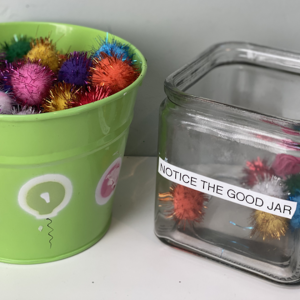Gratitude means appreciating what we have instead of worrying about what we don’t have. It may sound simple, but cultivating gratitude takes intention and practice. Here are a few of our favorites ways you and your family can grow your gratitude practice together.
Notice the Good Jar Celebrates Family Kindness
When we notice the good, we’re actively choosing a positive mindset. This is a simple way to grow gratitude — but it takes practice.
Peacemaker Thank Yous Connect Gratitude With Peace
Linking the feeling of peace with a parent, teacher or friend helps reinforce for kids that they’re not alone when they need help regulating.
Toss the Gratitude Ball to Express Thanks
In this game, the idea is to inspire young children to think of the small things in their lives they’re grateful for.
Grateful For Our Knuckles Game Lends Perspective
Gratitude is simply perspective. When we’re mindfully aware of the most ordinary details of our lives, like our knuckles, we don’t have to search far to feel gratitude.
Life is Good Game Builds Habit of Gratitude
By acknowledging our challenges, then recognizing what is good in our lives, we can develop a habit of gratitude alongside difficult circumstances and feelings.
Show Appreation With a Family Gratitude Sharing Circle
Try this Family Gratitude Sharing Circle activity to encourage your family to express their thanks for one another.
More Gratitude Activities
Let your creative juices flow with our Gratitude Coloring Page.
Write a Gratitude Letter to remind you of the positive things and people in your life.
The Science Behind the Smiles
Recent research shows there are several benefits to consistently expressing gratitude, including increased happiness, stronger relationships and decreased stress and anxiety. Read on to learn more about why a practice of gratitude is good for you:
Giving Thanks Can Make you Happier (Harvard Medical School)
14 Benefits of Practicing Gratitude According to Science (PositivePsychology.com)
7 Surprising Health Benefits of Gratitude (TIME)
The Science of Gratitude (Greater Good Science Center)









Share this: